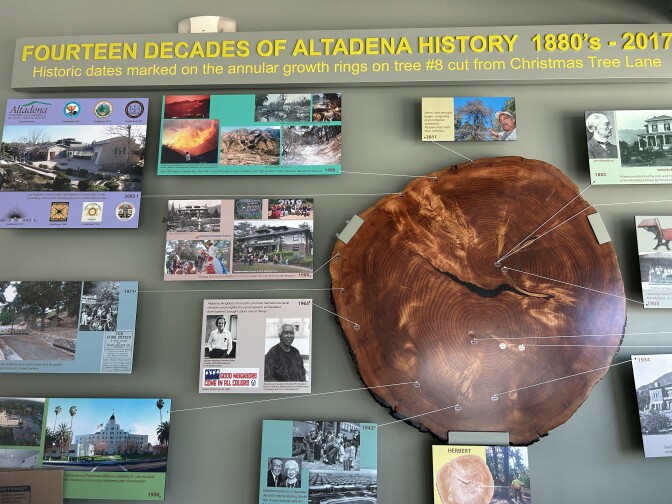This story is free to read because readers choose to support LAist. If you find value in independent local reporting, make a donation to power our newsroom today.
Volunteer historians are racing to record the stories and voices of Eaton Fire survivors

On a recent afternoon, Veronica Jones thumbed through files in the small community center building in Altadena.
“This building holds the history of Altadena. We have been archiving for 90 years,” said Jones, president of the Altadena Historical Society and a resident for more than 60 years.
When the Eaton Fire burned through Altadena, it erased more than homes. It also took family photos, heirlooms and history.
Jones and a small group of volunteers are now working to restore some of that history through the voices of fire survivors.
“Before we kind of worked at our own pace,” Jones said, noting the society is made up of all volunteers, more than half of whom lost their homes. “Now there's an urgency to document everything, to get the history of the fire, to get the history that we didn't have before, to find ways to capture those photographs that may have burned.”
They decided oral history was one way to do that.
“The oral history project came out of the fact that, OK, now the black and white pictures are gone — what are we going to do?” Jones said.
The historical society has long recorded oral histories of residents for archiving. Now they want to capture as many stories of fire survivors as they can.

So far they’ve focused on capturing the stories of Black families in Altadena who lost their homes.
That specific history — of racist housing policies that concentrated Black families in west Altadena — became a national story when the Eaton Fire disproportionately affected that part of the community.
How to participate in the Altadena oral history project
The project is open to anyone who lost a home in Altadena and wants to share a story. Jones said the project is expected to run over the next two years, and interviews usually take a few hours.
People who want to participate can reach out to the society directly at (626) 797-8016 or altadenahistorical.society@yahoo.com. A link to sign up to participate will also be added to the historical society’s website in mid-July.
The historical society is also seeking funding to help support the project.
“If you're going to have roots here and stay here, you need to know how this town came about,” Jones said. “You need to understand that the culture of the town evolved because of the history, because of the redlining.”
Jones and her team have so far recorded the voices and stories of an 86 year old musician, a multigenerational family and a lifelong Altadenan in his 90s, among others.
“We started out with the project thinking we want to give hope,” Jones said. “We know that the fire was horrible. But how do we give hope that even when something like that happens? ”
Jones hopes the project — the connection of this moment to the long arc of Altadena’s history — can be something of a comfort to survivors.
“The good thing about history is you realize you're a part of it, but a very small part of it,” Jones said. “There's a whole timeline that happened before us, and that's going to happen after us. There's been worse times, and there'll be worse times again. And there'll be good times again.”
Block after block of former neighborhoods near the historical society are now cleared, empty lots. The landscape is starting to look more like an old poster advertising land for sale in what realtors of the past called the "Altadena Woodlands.”
On a wall in the main building of the community center, there’s a cut of a 140-year-old tree.
The tree, named Herbert by a local, had to be cut down for safety reasons in 2017. Strings extend from the tree’s rings, marking specific years and connecting them to plaques that highlight moments in Altadena’s history.
1883: When Altadena was officially established by John and Fred Woodbury.
1965: When neighbors came together to improve race relations.
2011: When an apocalyptic windstorm toppled thousands of trees in the area.

One day, the Eaton Fire will be a moment in another tree’s ring. And the Altadena Historical Society wants to make sure the multitude of stories within that moment are remembered.
“I'm hoping 20 years, 25 years from now, someone is listening or watching the oral histories and they just go, ‘You know, Altadena is an amazing place,'” Jones said. “It was an amazing place, and it still is an amazing place.”















